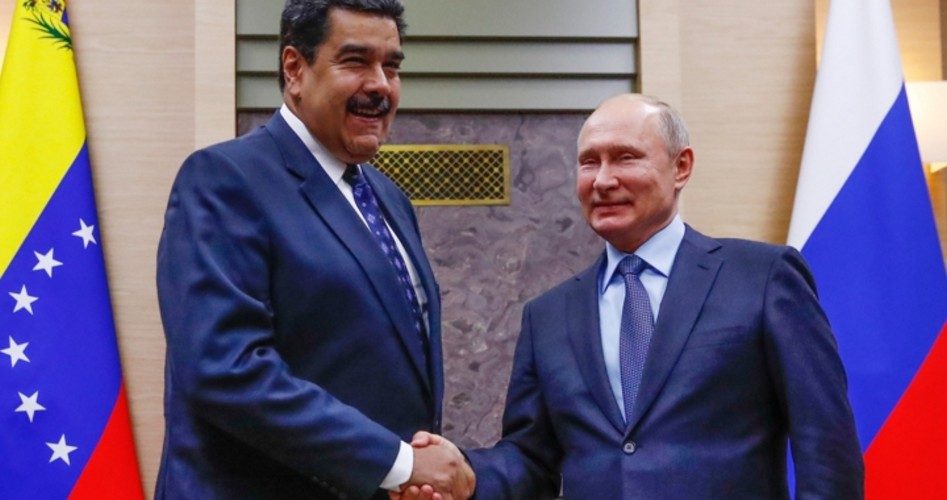
Following last week’s visit to the Kremlin to seek support from Putin for his tottering regime, Venezuelan dictator Nicolás Maduro welcomed on Monday two Russian supersonic aircraft and two support aircraft, which landed at an airport outside Caracas. Two days later, Maduro accused U.S. National Security Advisor John Bolton of plotting a U.S. invasion to remove him from power. Said Maduro on state television: “I have no doubts that the U.S. administration including John Bolton has plans for Venezuela. I also have absolute and unending faith in Venezuela’s [newly enhanced] armed forces.” He added: “Venezuela does not kneel down, does not surrender. Venezuela will continue in peace and democracy. Let the American empire know!”
Maduro supplied a few details about the alleged planned invasion: The U.S. government was funding the training of some 734 mercenaries in neighboring Colombia, along with help from Colombia’s newly elected President Ivan Duque and Brazil’s president-elect Jair Bolsonaro.
Initially, Secretary of State Mike Pompeo scoffed at the arrival of the two Russian Tu-160 “Blackjack” supersonic bombers (along with two additional aircraft carrying Russian officials and military support personnel) by tweeting, “Russia’s government has sent bombers halfway around the world to Venezuela. The Russian and Venezuelan people should see this for what it is: two corrupt governments squandering public funds and squelching liberty and freedom while their people suffer.”
But behind the scenes, an entirely different conversation was taking place between Trump and Putin officials. Some media called it a “spat,” but the outcome was announced by the White House on Wednesday: The offending aircraft would be returning to Russia on Friday. White House Press Secretary Sarah Sanders was diplomatic: “We have spoken with representatives of Russia and have been informed that their military aircraft, which landed in Venezuela [on Monday], will be leaving on Friday and going back to Russia.”
Part of the “spat” revolved around Russia’s deliberate projection of force in the southern hemisphere and a warning to the United States that Russia had Venezuela’s back. That warning was backed up by the arrival of those two Tu-160s, the largest, heaviest, and fastest swept-wing combat aircraft in the world. Although the planes landing in Venezuela were assumed to be unarmed, the Tu-160 is capable of carrying nuclear-tipped cruise missiles with a range sufficient to reach nearly every major city in the United States. The fact that Putin sent two of the 16 Tu-160s known to be in his arsenal 6,200 miles to Caracas to make a point no doubt changed the conversation in Washington.
Bolton’s office made no comment on Maduro’s charges but it didn’t have to. As The New American has pointed out, the United States appears to have the same intention in Venezuela as it has in Iran. As we noted, “Rudy Giuliani and National Security Advisor John Bolton have loudly and publicly called for the overthrow of Iran’s totalitarian theocracy.” And as Mike Pompeo stated, “The Iranian regime has a choice: it can either do a 180-degree turn from its outlawed course of action and act like a normal country, or it can see its economy crumble.”
This could be applied to Venezuela as well. Sanctions against the Marxist regime by the Trump administration have the same message: Behave, or else. That the Venezuelan citizenry are suffering is a matter of common knowledge: Inflation has destroyed the currency, and price controls have created shortages of medicine, food, and essential personal items. Millions have left the country, while those remaining are living in desperate poverty. U.S. companies long operating in Venezuela, such as Kellogg and Clorox, have closed up shop, followed on Monday by the announcement from tire-maker Goodyear that it was ending operations there as well. Its severance pay wasn’t in the worthless currency, the newly-created “sovereign bolivar” that replaced the previous worthless currency, the “strong bolivar.” Instead, the company gave each departing employee something he could barter with: Ten automobile tires.
But is the suffering of the Venezuelan citizenry sufficient reason for the United States to intervene? Even if Bolton has no plans to invade using mercs, one remembers that the “military option,” according to his boss, remains on the table for “resolving” the situation in Venezuela. The U.S. Constitution has plenty to say about such behavior, but in Washington such restraints put in place by the Founders to keep the chief executive from becoming the chief policeman of the world are too often ignored. In that brave new rudderless world, the end justifies the means.
Photo: AP Images
An Ivy League graduate and former investment advisor, Bob is a regular contributor to The New American magazine and blogs frequently at LightFromTheRight.com, primarily on economics and politics. He can be reached at [email protected].
Related article:
Will Neoconservatives Convince Trump to Favor Regime Change in Iran?



